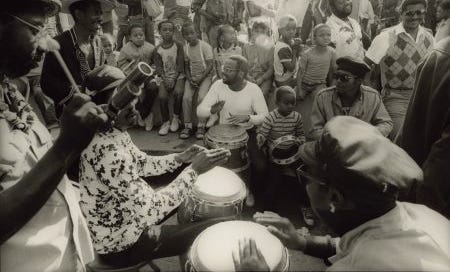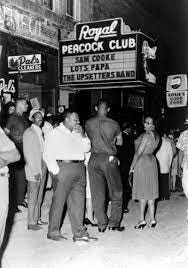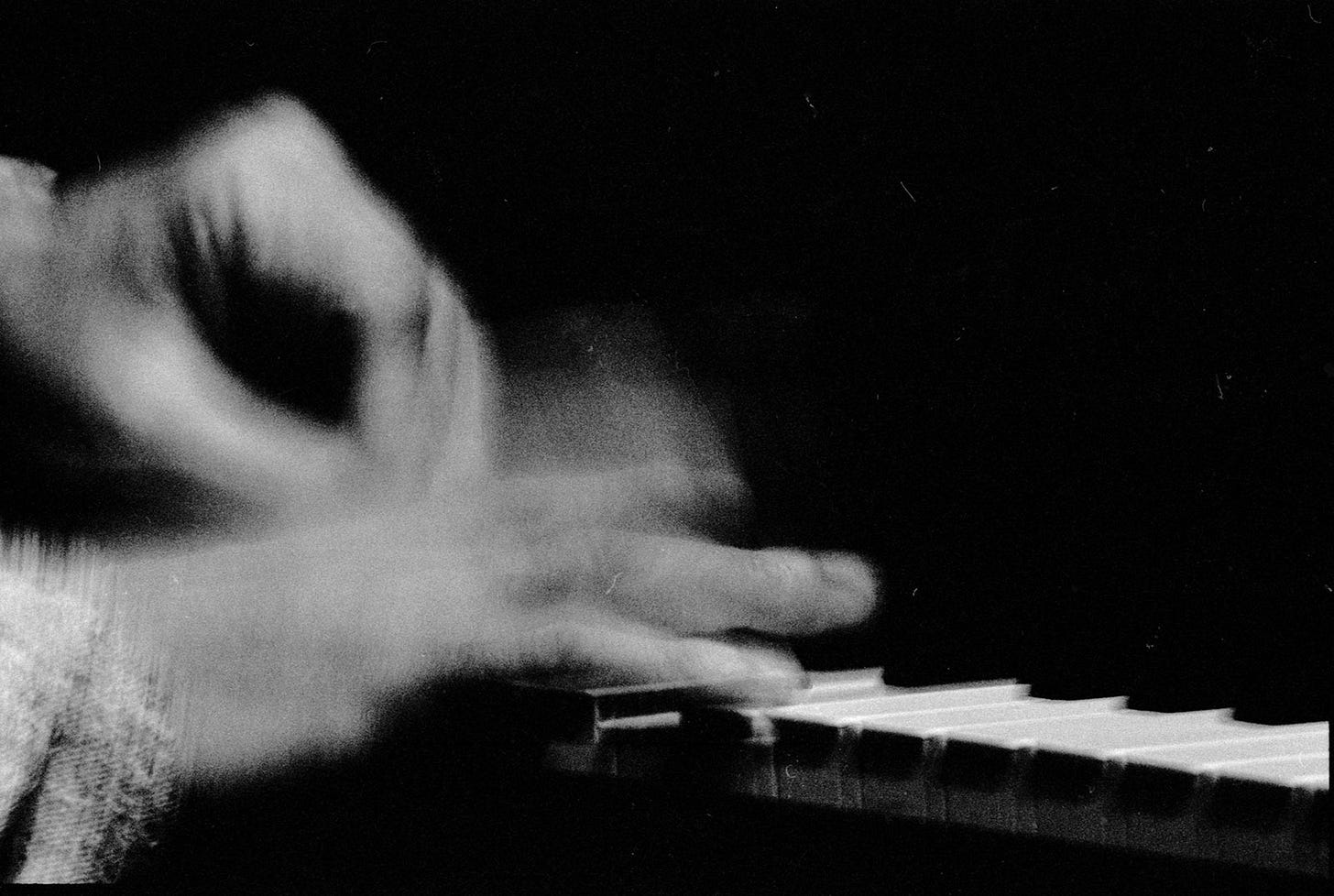The Club
A look at what a nightclub is, has been, and might become in order to stop being a threat to the survival of love and great music.
No Place
The brief history of the black-owned performance venue is stranded in the field, barefoot and disinterested in its own inheritance. No one dreams of inheriting the House of the Rising Sun, or the dens of sin and decadence we call nightclubs, where any beautiful music or dance one might encounter is appropriated as foreplay for the casual, often vapid erotics of after hours social life. Artists and performers even take on the approach of spectators and exploit themselves in these contexts, often becoming addicted to the access to instant gratification offered at the club and unfit for quieter or more stable civilian lifestyles. The delicate, dysfunctional momentum of tour or going round in circles like circus acts takes hold and an inner restlessness accrues whenever there’s an absence of the distractions of the road. Such is the purgatory of possessing marketable artistic talents in a country whose first concept of performance on the road was the minstrel or medicine show. This did not indicate medicine as in medicinal or healing but medicine as in a patented goop of wonder drug that might temporarily alleviate the symptoms of your alienation.
Touring or going on tour in this atmosphere becomes the process of becoming cargo and then growing out of the crates into capital and there’s rhythm to that; catching that beat is lucrative. Caught in it are capital songs, capital records, work songs, jukes, wrong-for-that musics of toil and total romance. The romance of the road, not in the way Kerouac meant it as a wannabe exile, but in the way Robert Johnson meant it as a fugitive from the devil.
Touring becomes an endless spinning like being a magician’s trick baton, turning into a cop’s baton at random and policing yourself, or the practice of being invited somewhere by white people to play black music and entertain, for the purposes of this exploration. Every great black musician who noticed this fixed relation mentioned it or troubled it at least once, either in protest song or by trying to create their own venue or club or any space—even a house or church or garden, to contend with all the places that thrive by puppeting and patrolling black creative talent for profit. At the very least we can learn to marionette on our own terms.
What is a club? Suit in deck of gambler’s contraband, bulky looking thing, logo-ready but no logic, site of an irrational set of practices dismissively called performance. How does music end up inside of it more often than elsewhere, performed before it is lived, extracted, appropriated from daily life where music makes survival tactics bearable, to become an idea on a stage, where survival is conceptual and the content of black music no longer urgent. There’s a tender brutalism to the fatedness of nightlife, where even the social codes are often rehearsed and performed dalliances that accent the activity on a stage, all staged as a violently inherited tradition of social mobility negotiated in the shadows of marquees and banners.
Broken Origin Story/ Tokenism
The idea of clubs began as one centered around the idea of members. These were groups you could join or apply to that would meet and discuss ideas or play games or share secrets and exclude non-members to protect some grand and arbitrary purpose predicated upon and deriving its meaning from exclusion and scarcity. No blacks allowed the country club. No counrty niggas allowed in the club. Come in through the kitchen to the stage and play our club some music. Maybe that’s how it shifted and expanded to include nightclubs, in the great American tradition of you can’t join us but you can entertain us. And then that changed when social camaraderie developed across racial lines and the clubs became amorphous and diverse commercial spaces you could simply buy your way into—meet there and dance, meet there and be the liberated spectator haunting the always-hunting specter where work and leisure diverge for one group and not the other, often according to class or color. Work song. Lapdance. Just a taste, blistered hands, wobbly eyes on the spindling limbs of love for sale. Wrong club, or right one but askance from the virtue of prude exclusivity. Everybody is invited to this show. We get into the holds of the ships with no ID. We escape field negro hipness only to exile the blues to brothels and jukes and turn love commercial, terminal. It gets to be so you hope you don’t get in as if being denied would curb this addiction to being seen stage after stage.
Displace
I met Amiri Baraka in 2008 at Blue Note in New York. We’d both gone alone to the late show to see the trumpeter Jon Faddis. We were generations apart but united by a mutual love of poetry and jazz and late nights and blue notes. I went over and introduced myself and told him I was studying poetry at Columbia and loved his work, though it was seldom assigned to me there. He suggested we have a drink after the set and a friendship was born, one that felt like peering in, not being invited in but witnessing where you’ve always been meant to be. The club. Inside, ushered in by destiny. The kind of out-ness Amiri wrote about, out as in adventure and seeking, leaving the sunken womb of appeasement, getting out. Out as in the Henry Dumas story Will the Circle be Unbroken that imagines a blacks only jazz club with a species of horn called the afro-horn, lethal to white patrons. With Amiri I was in that eternal upward spiral that is the last club before nature, which is to say, poets united by a kinship of heart and spirit that is impossible to fake.
While living in New York, I frequented every jazz club I could and some dance clubs. I was looking for 1964 to 1973 in the 2000s. Often, without realizing I had at the time, I found it. I was friends with a New York Times Jazz critic and invited everywhere I wanted to be until these spaces became so familiar I was comfortable going alone when friends didn’t care about a Cecil Taylor show or another Pharoah Sanders at Birdland. And where curiosity and connections didn’t take me, allure did. After hours at the Vangaurd with Roy Hargrove or at APT with QTip on a night when Kanye had made a cameo and stood behind the DJ booth stoic for hours like a nigga mannequin.
Some nights we’d wander out at midnight during a blizzard and run into Mos Def performing underground somewhere or make it downtown in time to meet Lauryn Hill just as she was getting to her own concert, several hours after indignant fans had assembled studiously chipper about their refusal to acknowledge her reputation for working on what Sun Ra called the other side of time. I had moved to New York for academia, to become an artist, but the deepest elements of my education were happening at the club. The life in my blood, passed down from my father and my sister, performers in clubs, annexed to the filthy glamor of night with all the great ones who belong there and thrive there and are never leaving.
The club is not just a place or relationship to space and the body, it’s a relationship to time, a way of telling and making time, of living in a terrible black fantasy that only dawn interrupts. What was once forbidden is now a rite of passage that separates the mundane from the eternal as bluntly as day differentiates itself from night. It’s not always safe to trust our fantasies. Some are derivative at best and self-abnegating at worst. The club can be both, but once it becomes familiar where else is there to go. The stale ashy air troubled by vodka and close talking becomes a craving where it was once a repugnant, and each fated chance encounter another trick of worship, turning you into an advertisement for the very confusion of skill and entertainment or leisure and sacred listening that you are supposed to be remedying with your exclusion.
The only thing left to do is begin catering your songs to the environments they will find themselves in most frequently, so you set out to help build what was built on the assurance that you would disappear into your sound and be there but gone, a magician of oppression doing black magic music for a fee and a pat on the back from massah.
Every effort to make our own space where no standard from outside could intervene on the joy of coming together to sound a way, has been thwarted in some traumatic manner, like when Charles Mingus famously tried to start a school and workshop space in Harlem and was kicked out of the building for some arbitrary reason, his sheet music containing original compositions left cinematically blowing in the wind as he was arrested for even trying. And yet we live in a place that speaks casually of endless frontiers; why can’t we reinvent the way our music is delivered to live audiences or created or studied if we’re so inventive and free, why is that market rigged into a stagnant routine?
Plantation Tourism
Let me back up. So the first black clubs were the shack churches on plantations. Next came the field under moonlight. A fanged moon and fanged limbs flailing to mimic its slender grimace. Later came brothels. Then jukes, basements, more fields, with train tracks between one way of sounding and another, tracks laid down by one way of sounding to make a path toward the other, toward their own muting. Steel ladders on the floor separating the whisper from the scream and Jacob from the Black Jacobins. We were the first fascists, in that we decorated ourselves in codes of sonic urgency and lament and praise and dared anyone to look away or deny their validity. For a while having good taste meant a love for black music and art coupled with an intolerance for black people, and so musicians were invited to play all night shows behind curtains. When watching us was no longer taboo, by that time, black entertainment was too lucrative a commodity to allow outside on its own terms, there would be no out or sense of adventure or closed circuit upward spiral, just shows and whatever intimacy could be stolen back as refusal or backstage or code switch or the gods of small chance.
Disregard all of the jazz musicians who asked for concert halls instead of those seedy underground roads of professionalism in black entertainment, or wanted the luxury of playing and recording without the punishing road. No matter the circumstances, the show must go on, until we no longer have the will to imagine alternatives and we’re back to no place, worse than a broken circle, a limp one or void.
My favorite performance venues are the improvised stages and cyphers that have no place to be outside of the people who form them, and that only denial or genocide can close and not even that because those unbreakable circles and fractals are sacred insomuch as they are haunted and will haunt back. The people are the places and their souls can either menace or soothe you depending on how you do them. Do as in treat, treat as in don’t trick. Buying and selling will never be as reciprocal as knowing when to show up and knowing when to leave, the spontaneous unity of street performance. The best song structures are this cryptic awareness of how to work together that dissolves when observed too closely and refines when we leave the club and move into life as lyric.
Inconclusive
Organic performance is sacred and spontaneous, born of a necessity to convey the energy specific to a moment or context or culture or myth that needs asserting through dazzle and ritual. Performance is not supposed to be so beholden to the tastes of spectators or venue owners or ticket holders, and puppeted by the gaze, it’s supposed to defy these dynamics and confront the lull of daily life not with what it wants or is addicted to, but with what it needs. Busking might be deeper and more natural than touring clubs with these conventions in mind. Walking somewhere with a song in your heart and deciding to sing or play does more for the world than most work for hire musics. Some of our favorite performers were discovered when they began singing out of necessity or even despair. Billie Holiday needed food and sang at tables at a club in Harlem to earn tips, so that her and her mother could eat. Nina Simone was working in Atlantic City to pay for college and the owner of the club where she had been hired told her she could not just sit there and play piano like a negro Stravinsky, she had to sing. So she started singing, before that she had studied classical piano, no words attached, and was strictly devoted to becoming a classical pianist.
What we want out of nightclubs is a utopian escapism where every libidinal drive suppressed by automatic and normative daily habits can make itself known and be satisfied. Reverence for music and performance is secondary to the validation one feels for one’s unique and often chauvinistic tastes as a spectator, as if the creative act is choosing to watch, to be there. This is a false sense of agency that I hope dissolves and disappears from social life, to be replaced by something more like Mardis Gras or Carnival, harder to police and curate, and more about people unleashing their deepest drives as collective improvisers who don’t harbor such an entitled relationship with the world that they expect to be entertained all the time, for a small fee. The exchange happening in clubs is vampiric and it’s becoming obsolete and almost goofy. It’s time to stop performing while continuing to make what we make and let the chips fall where they may. If nothing else, the adventure that withholding is will be a nice shift from the steady hemorrhaging of energy that happens on most stages. And it’s good to be disoriented by the familiar, like an inverse deja vu, it’s good to be estranged from our need to entertain one another and sit in the awkward antisocial blur of unadorned togetherness that might suddenly become a collective performance of something more like liberation and less like vandalism of the spirit for show.
Resegregation…
This examination is ongoing and the next phase is regression unless we take to the streets and dance. In the next section I’ll look at the history of cabaret cards and how it relates to today, and I’ll look underground.








This is an incredible read
you've done it again!